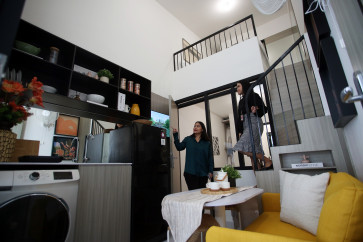Popular Reads
Top Results
Can't find what you're looking for?
View all search resultsPopular Reads
Top Results
Can't find what you're looking for?
View all search resultsBy the way ... Who needs bribery? Play by the rules
In Jakarta, we often hear horror stories of expatriates having to pay âadditional feesâ to a middleman in order to obtain a visa, KITAS, or other documents to live legally in this country
Change text size
Gift Premium Articles
to Anyone

I
n Jakarta, we often hear horror stories of expatriates having to pay 'additional fees' to a middleman in order to obtain a visa, KITAS, or other documents to live legally in this country.
Especially in Bali, they sometimes bend various rules at the immigration office in an effort to maintain their lifestyles in the 'Paradise of the Gods'.
These middlemen can occasionally be helpful by helping expats move through the bureaucratic maze more quickly, but expats will often have to pay high fees for the service.
In my experience, such an approach is not necessary.
Since my so-called 'retirement' around 2007 as an urban planner, I have followed the regulations of the local immigration office in West Jakarta very carefully, only paying the posted rates for yearly visas (KITAS) and re-entry permits.
In 2013, a helpful official told me that it was time to process a document called kartu ijin tinggal tetap (KITAP) with my Indonesian wife's sponsorship letter as backup.
Since this official was engaged to be married, I proposed that he and his fiancée join my wife and I for a meal out together. He said, 'Yes, that sounds fine', and so it happened. We also attended their wedding reception at a hotel shortly afterwards. This gave my KITAP application a human face.
I had to be patient and polite, going through the various steps from the local office, to the Jakarta administration, and then to central government level.
Also that year, I had to obtain an official marriage report from the Jakarta administration to prove that we were legally married. Before then we would always use the marriage certificate from the county in the United States where we actually got married.
For several years now, I have not paid a middleman to process my Indonesia visas (KITAS or KITAP) and re-entry permits. Although my Indonesian isn't the greatest, it has been good enough for the purpose.
In fact, I was invited twice to attend seminars at the local immigration office, where there were senior officials from the Directorate General of Immigration and the Manpower Ministry speaking. I gave positive testimonials in these seminars, simply showing that the regulations were straightforward and reasonable.
Finally, last year, with my KITAP and Jakarta identity card (KTP) for foreigners in hand, I was given an Indonesian driver's license (SIM) for five years.
This is rather humorous because my wife has forbidden me from driving a car here, at least in Jakarta, where we have lived for over 30 years. She is concerned by the combination of aggressive motorcycles, incredibly crowded traffic, and my personal difficulty in containing my anger.
Another irony is that I have been able to use my Indonesian SIM to rent a car in the United States. No problem and it looks very high-tech.
What is the bottom line from this tale of the Indonesian immigration office? It is that, based on my personal experience with these institutions, if you follow their regulations, see their human side, are patient and polite, and possess a reasonable degree of Bahasa Indonesia, you will understand that these officials are operating with reduced corruption, and are trying to be reasonable civil servants.
' John L. Taylor









